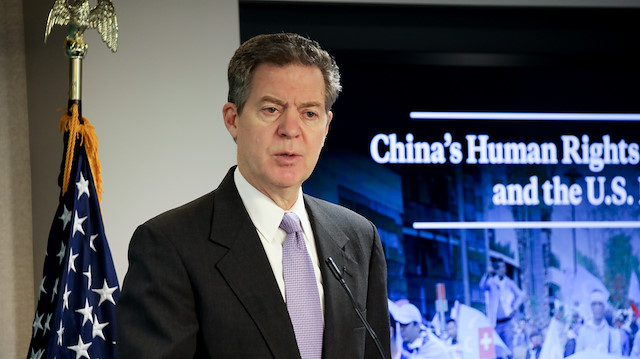
Beijing waging ‘war on faith, truth and international norms,’ says US Ambassador for International Religious Freedom
China considers its policies in Tibet a success and replicates the same repressive playbook in Xinjiang against Uighurs, said an American expert.
Speaking at a panel at the Washington-based Hudson Institute think-tank Wednesday, Ambassador at large for International Religious Freedom Sam Brownback said China is waging a losing "war on faith, truth and international norms."
Brownback highlighted "human rights violations and abuses of China" against Uighurs in mass detention in Xianjiang, a Turkic people in the northwest.
Brownback said 1 million Uighurs, since April 2017, in the name of China's countering religious extremism and war on terror, have been forced to part ways with their religious traditions in internment camps, which are officially called the Vocational Education and Training Centers by the Chinese government.
He stressed that various U.S. federal agencies has slapped sanctions on China and Chinese officials to raise awareness and minimize the repression of Xinjiang residents, which he said are "no longer allegations" but "eyewitness testimonies."
Drawing parallels between Chinese policies in Xinjiang and Tibet, Brownback urged panelists to take note of the name of one particular Chinese official who oversees Xinjiang affairs, Chen Quanguo.
He was first placed in Tibet to test a massive grid of physical and technological surveillance and life in Tibet, including religious life, was forever transformed, the ambassador said.
"Considered it a success, Chen took his playbook to Xinjiang, amplifying his tactics at an unfathomable scale," he added.
Other names on the panel included Axios reporter Bethany Allen-Ebrahimian, Hudson senior fellows Eric Brown and Nina Shea, Uyghur Human Rights Project Board Chair Nury Turkel, and Victims of Communism Memorial Foundation senior fellow Adrian Zenz.
They drew attention to recently leaked documents exposing China's strategy of "implementing the largest-scale persecution of a distinct ethnic-religious group since the end of World War II."
- Trade war card or real concern
Early this month, the U.S. House of Representatives passed The Uyghur Human Rights Policy Act that places sanctions on Chinese officials responsible for human rights abuses.
The administration of U.S. President Donald Trump has designated China a strategic rival to U.S. interests since he took office and the two giant competitors are in the midst of a major, on and off trade war.
China is accused by the UN and myriad other states and groups of carrying out repressive policies against the Uighurs and restraining their religious, commercial and cultural rights.
Up to 1 million people, or about 7% of the Muslim population in Xinjiang, have been incarcerated in an expanding network of camps, according to U.S. officials and UN experts.
In a report last September on Uighurs, Human Rights Watch accused the Chinese government of carrying out a “systematic campaign of human rights violations.”
China, which desperately needs the rich natural resources of Xinjiang to fuel its economic growth and demand, denies any charge, claiming Uighurs are being educated in "vocational training centers."
Hello, the comments you share on our site are a valuable resource for other users. Please respect other users and different opinions. Do not use rude, offensive, derogatory, or discriminatory language.
The floor is all yours.








